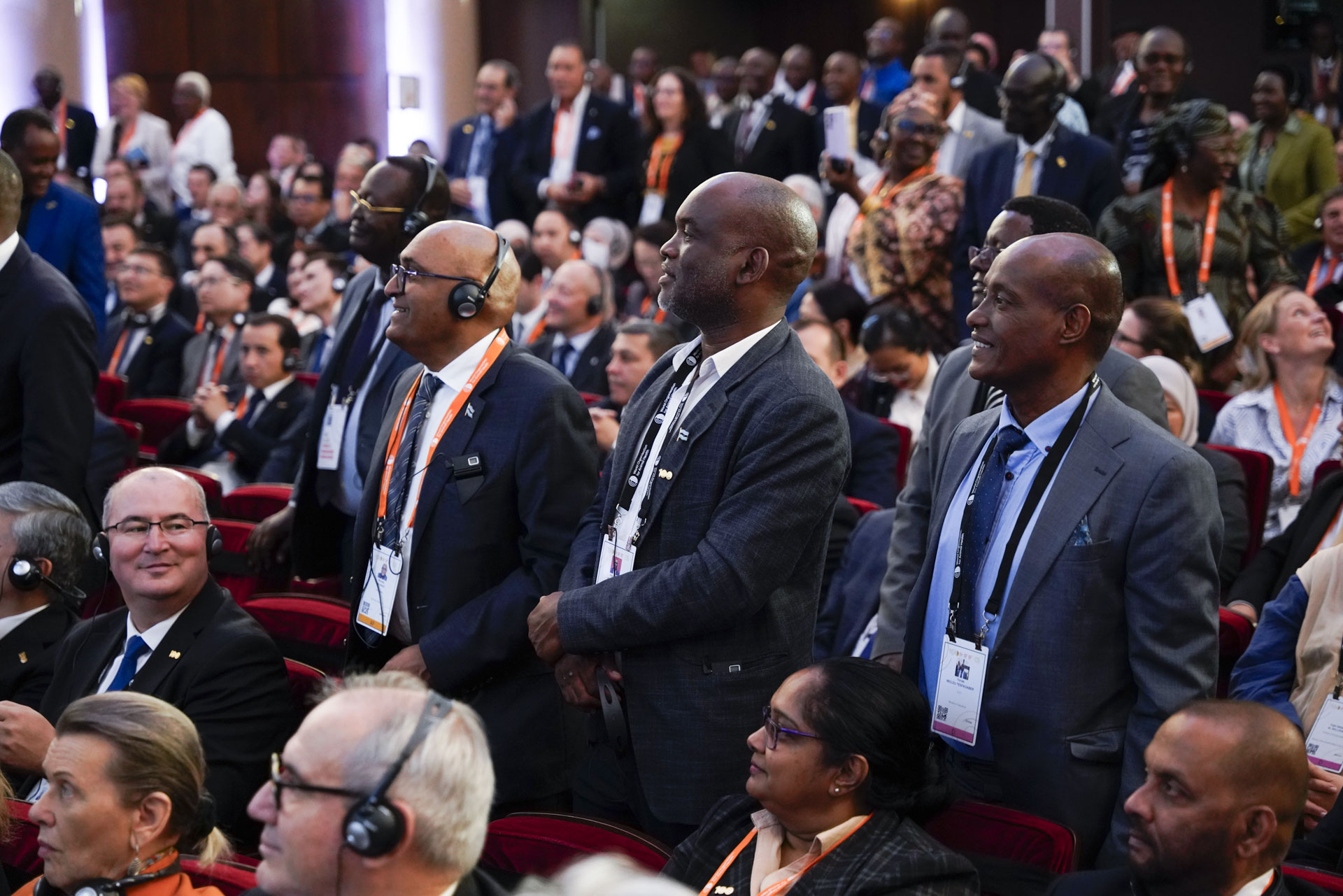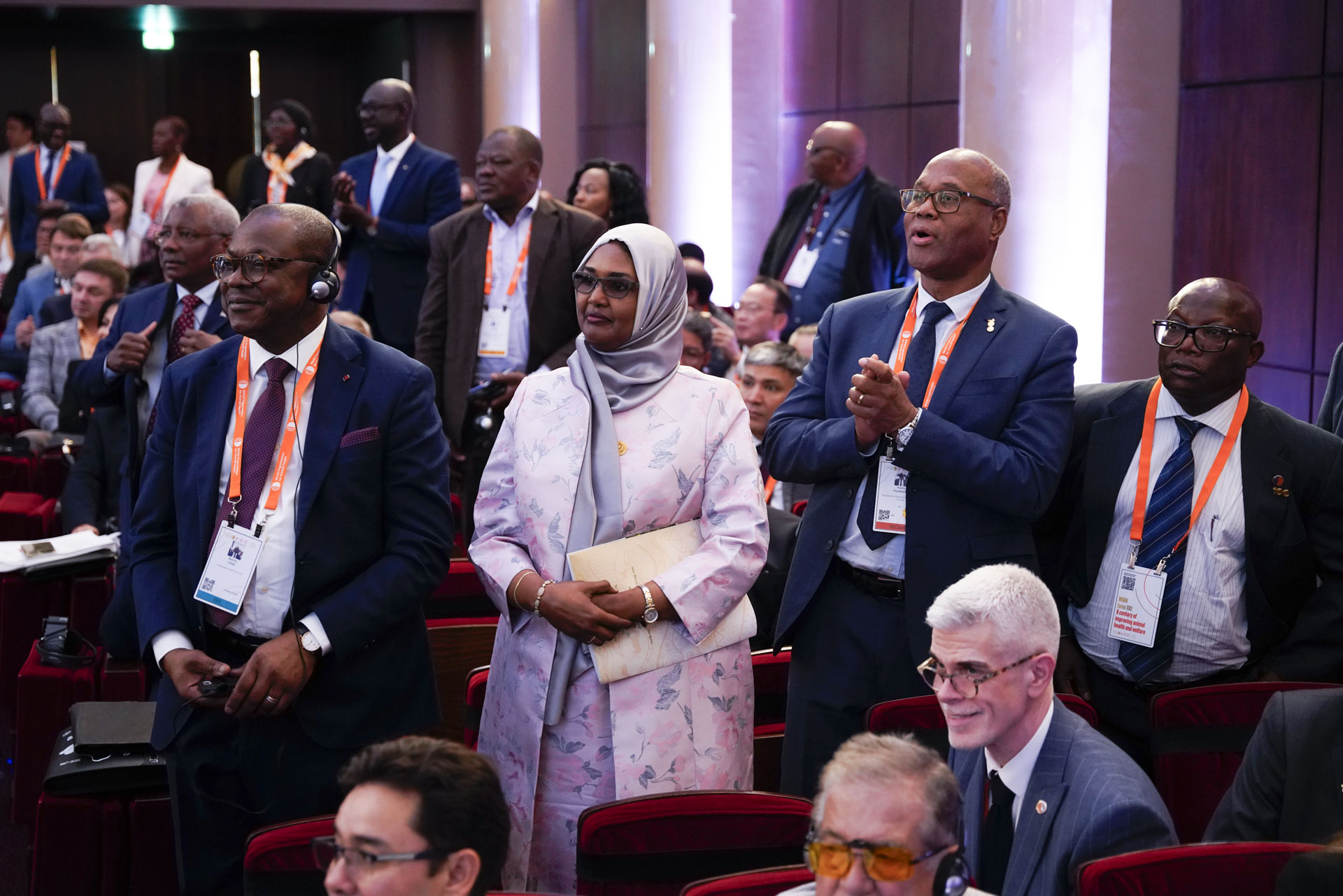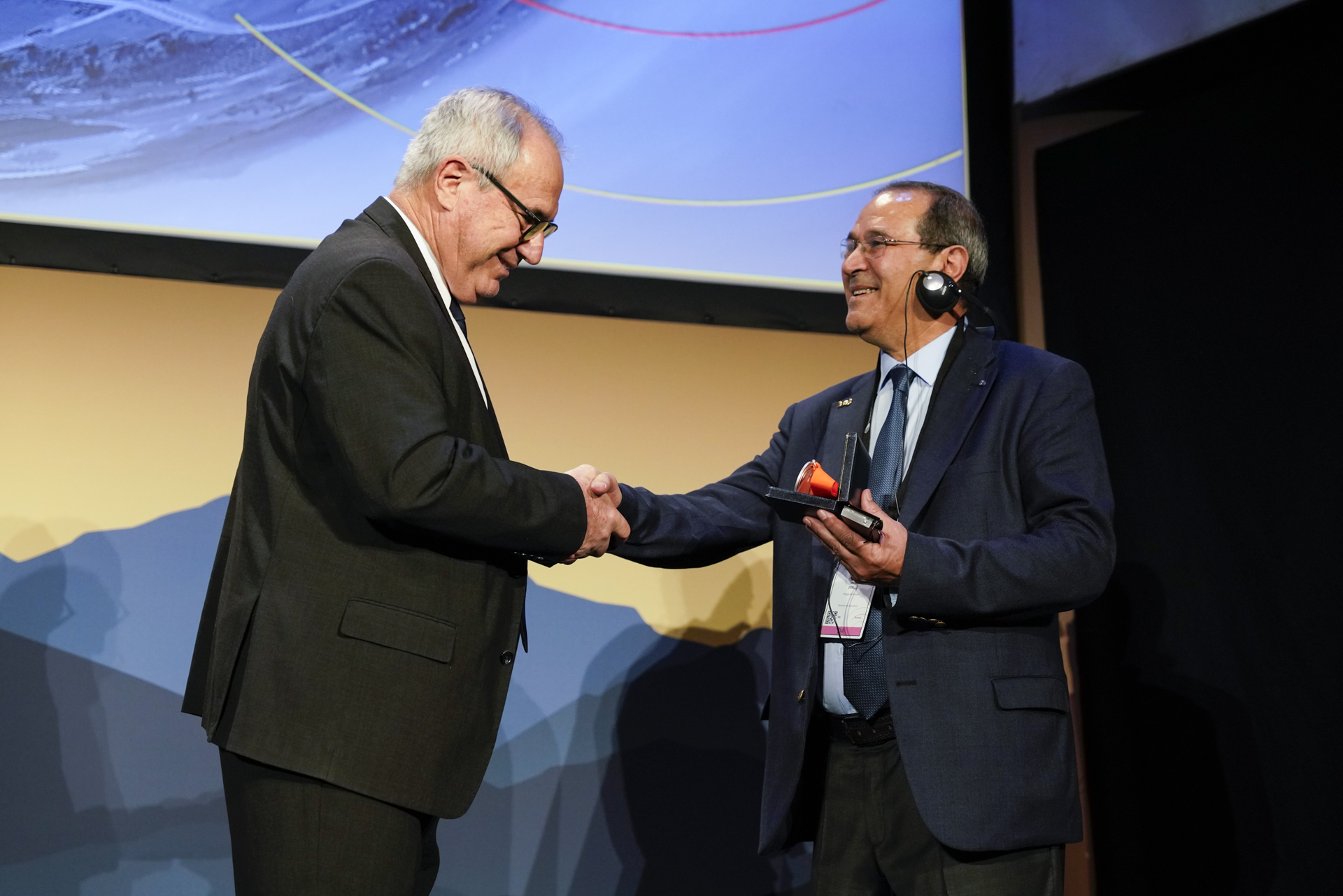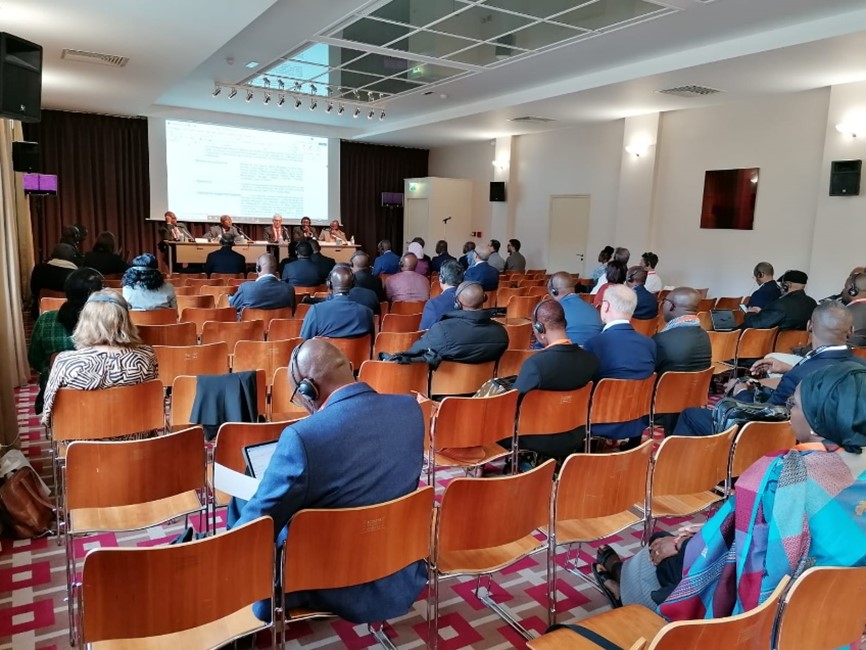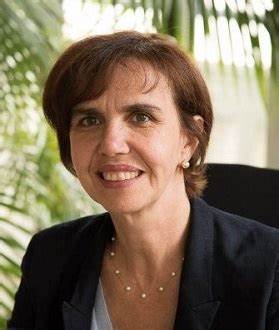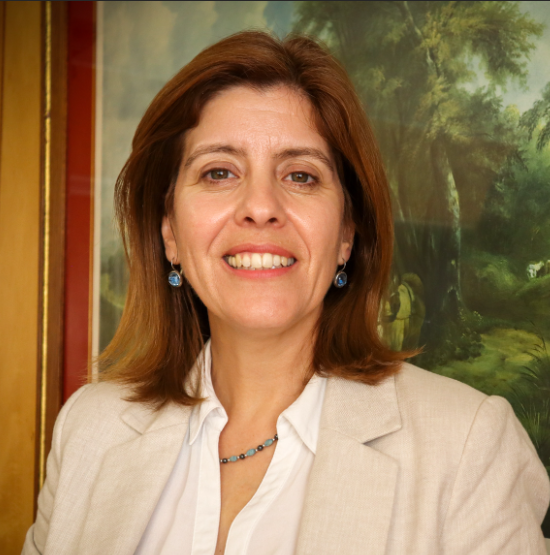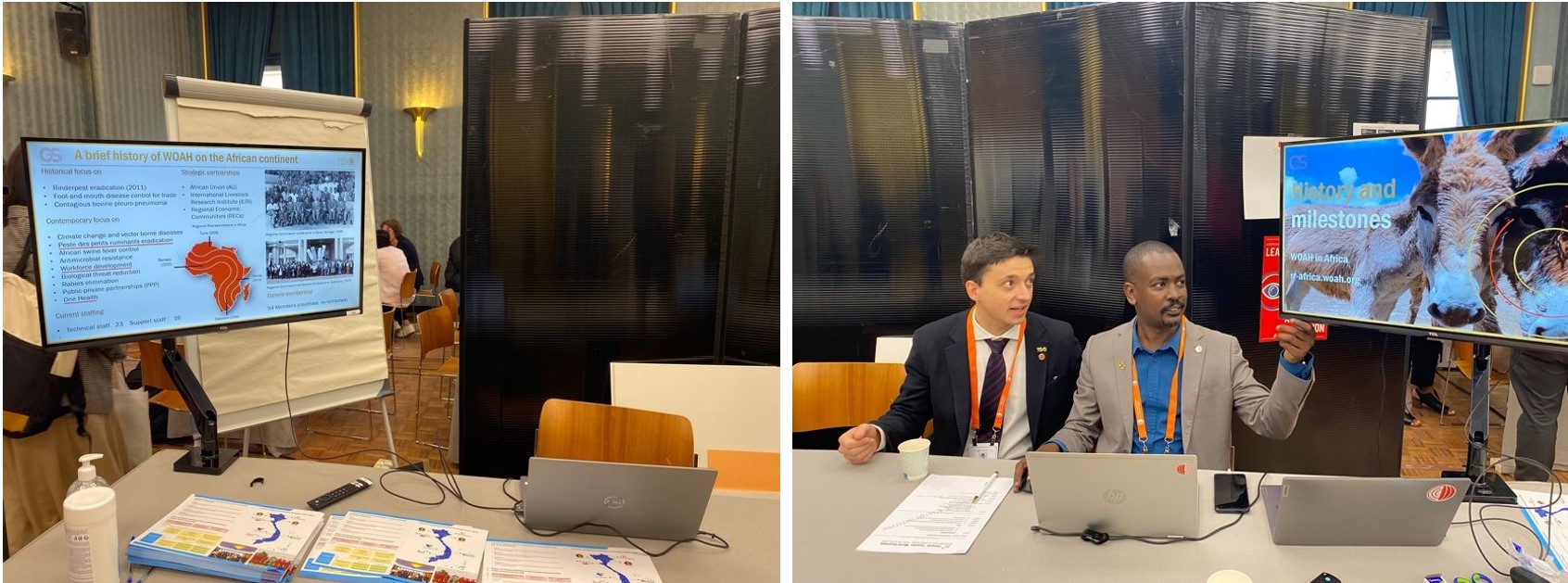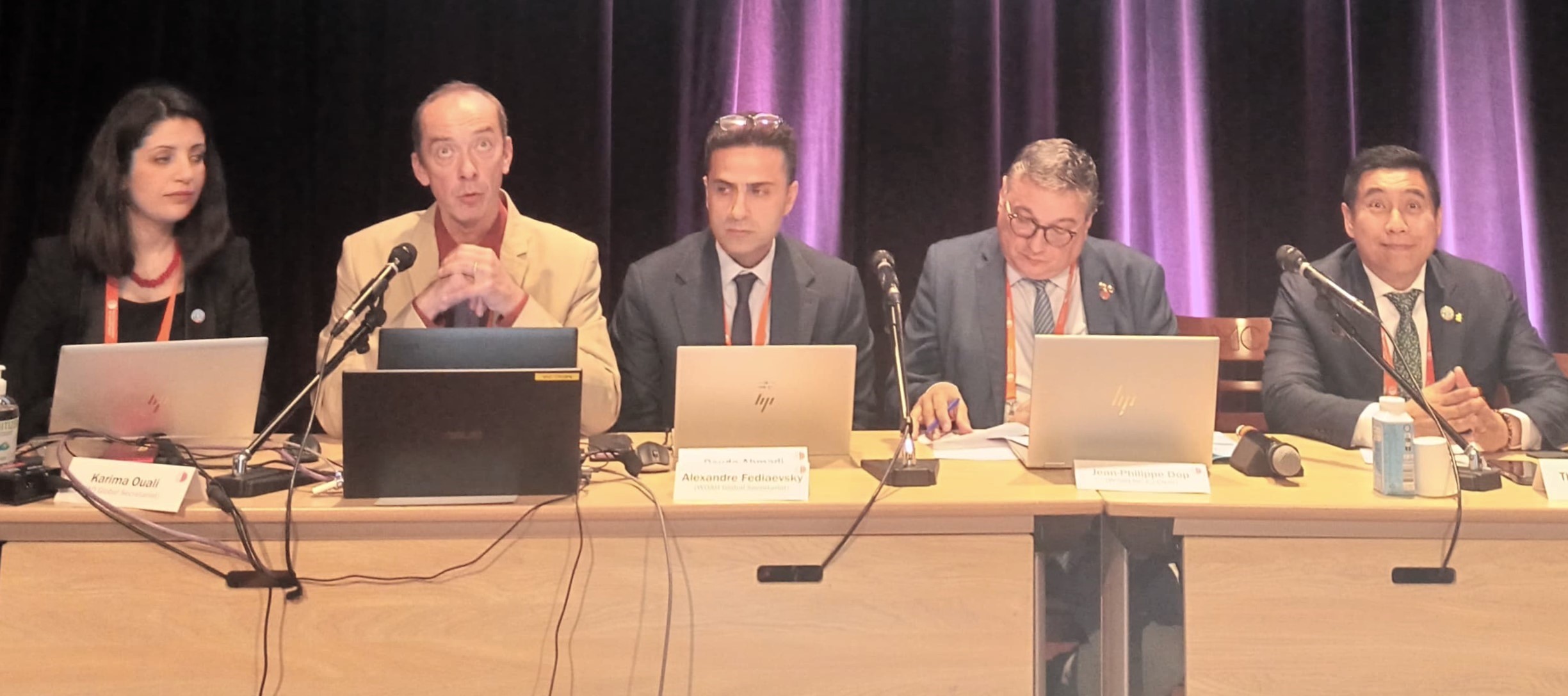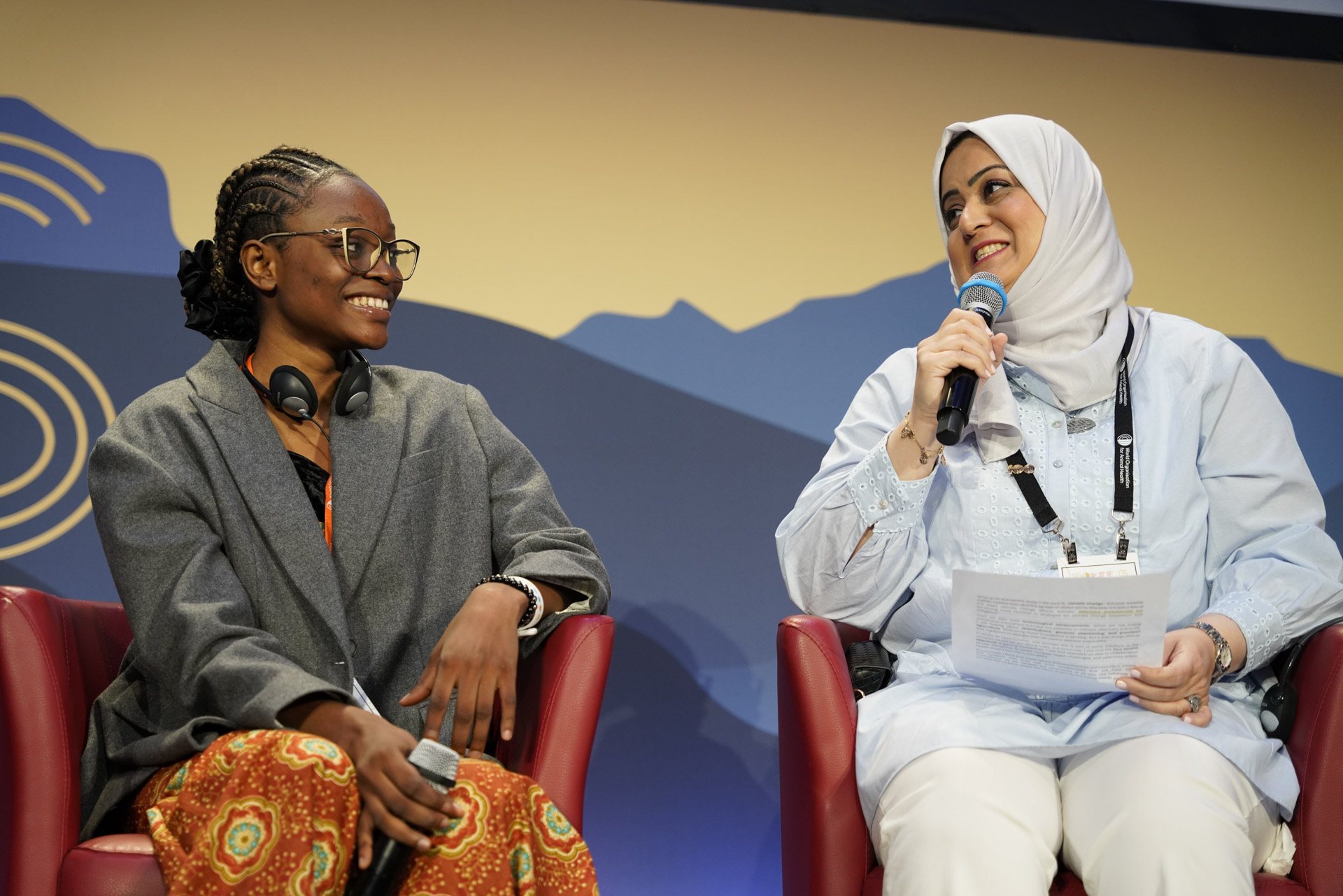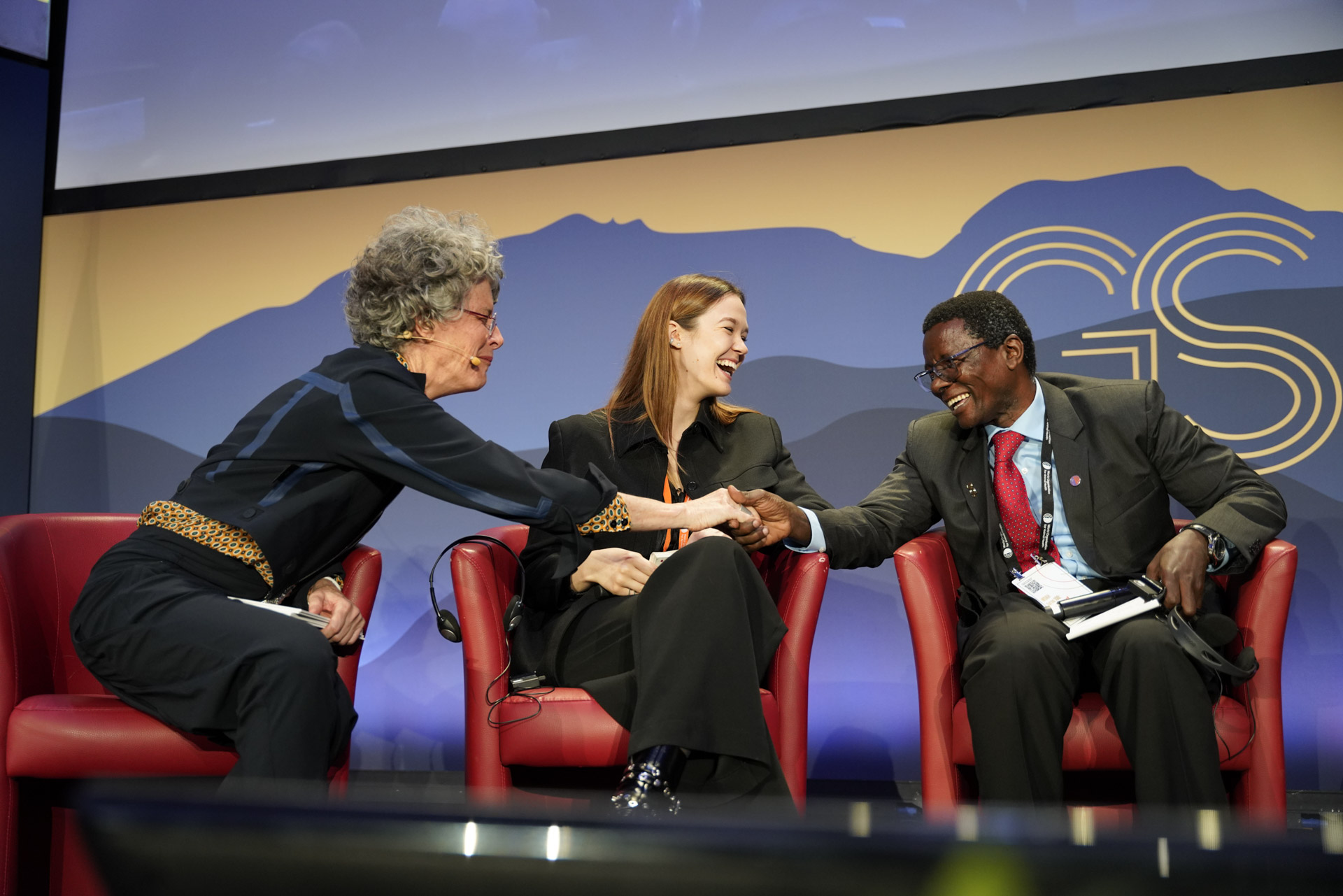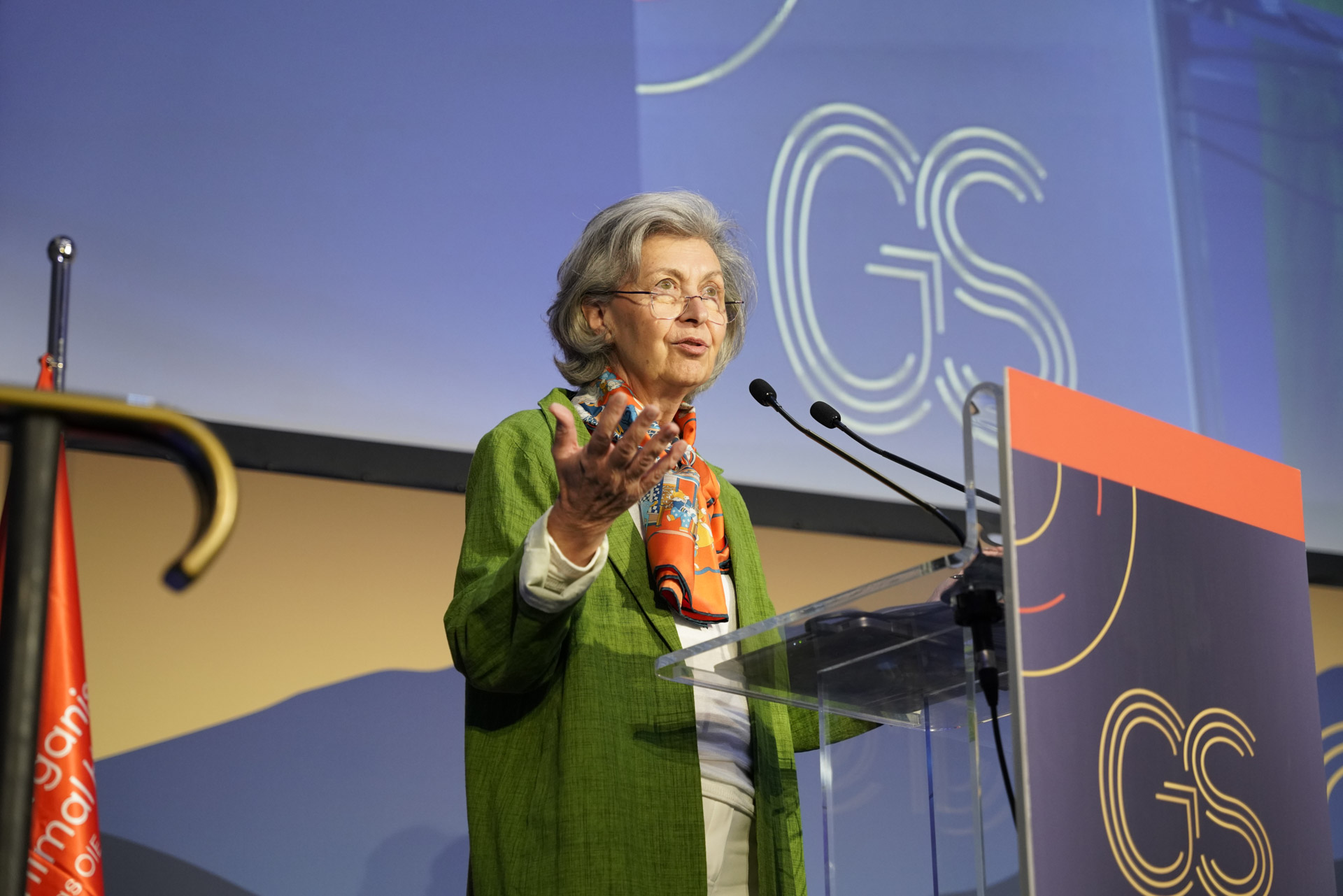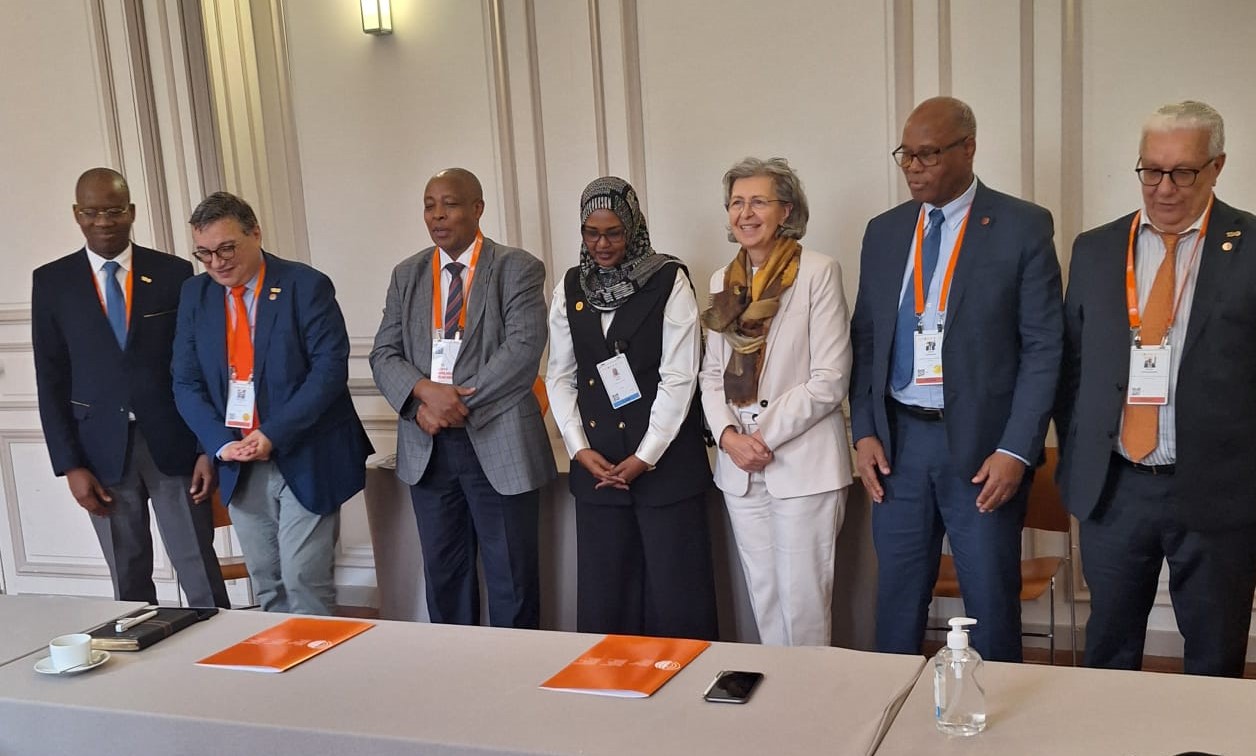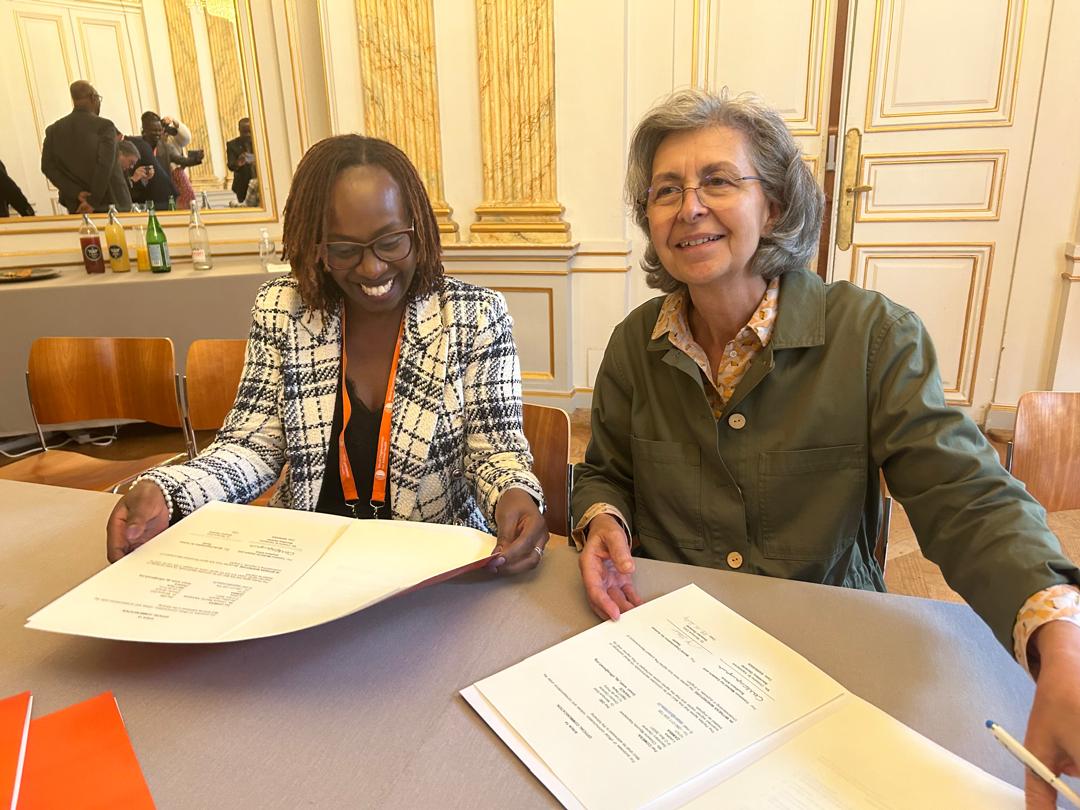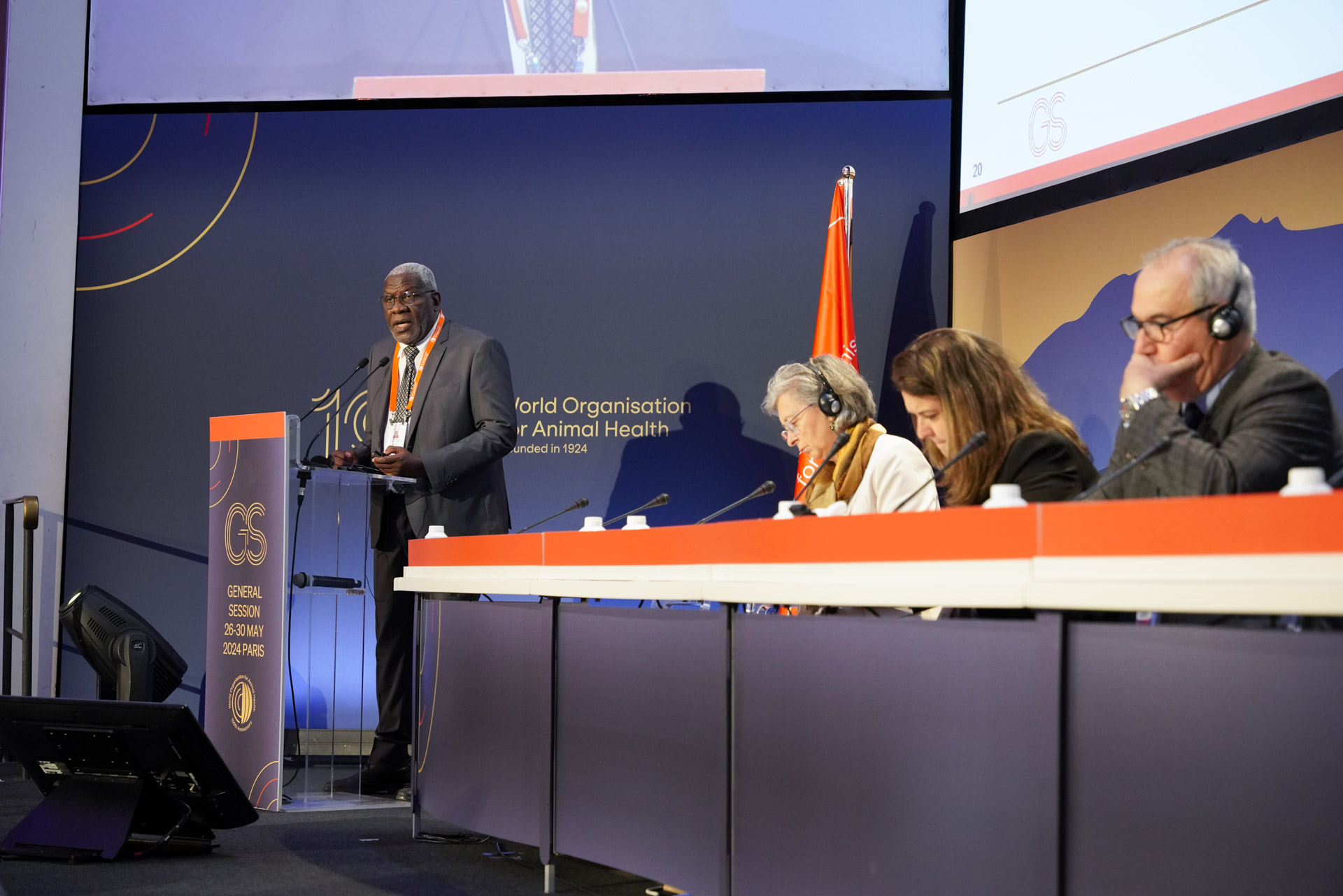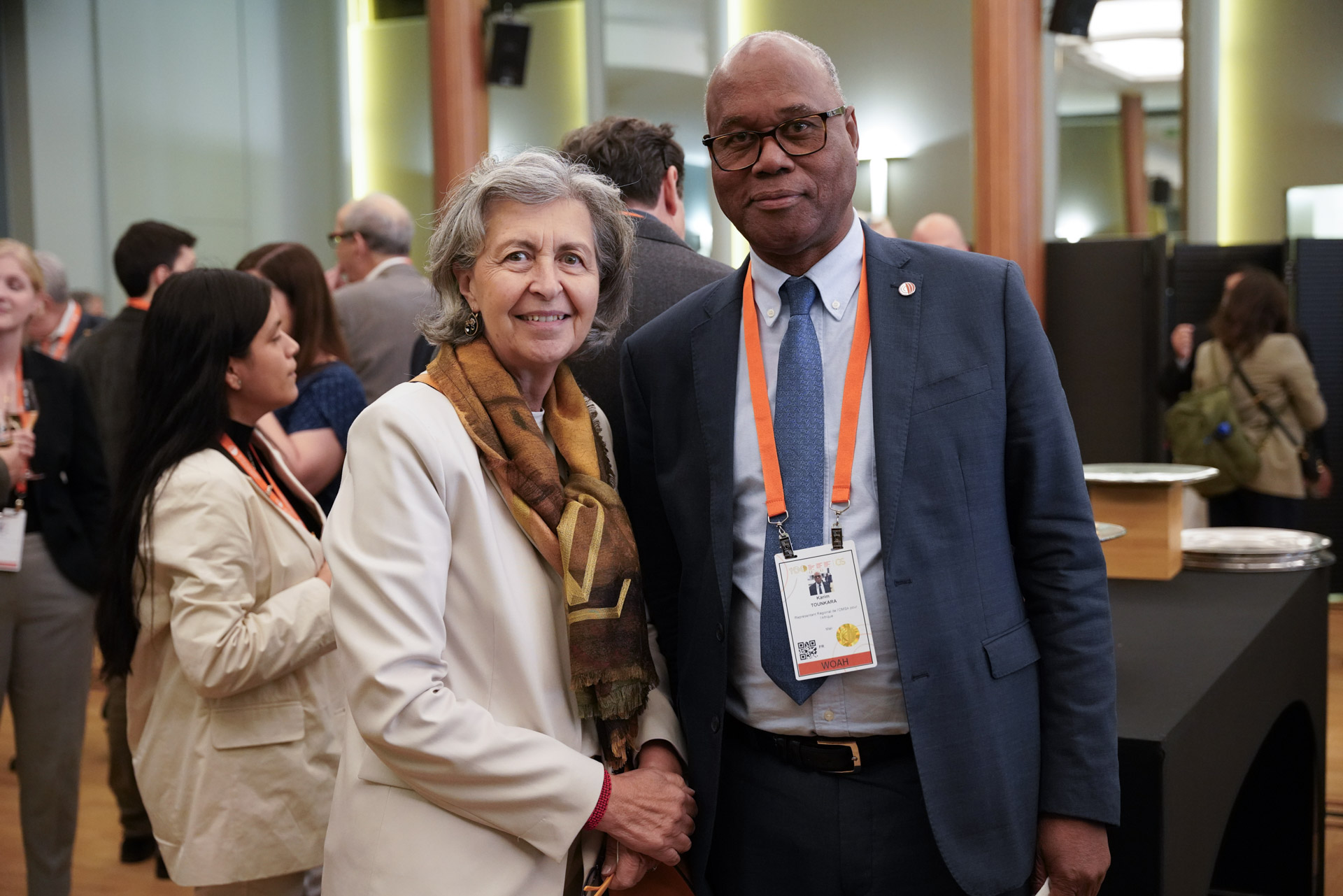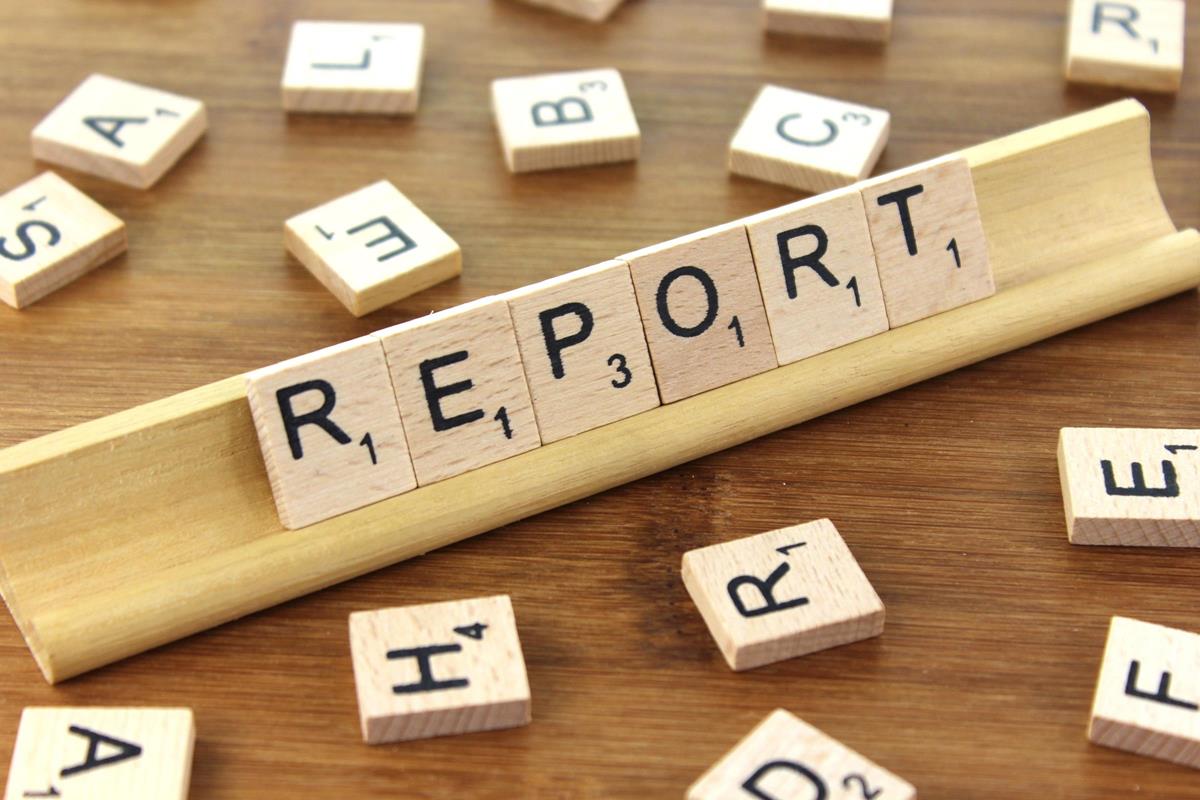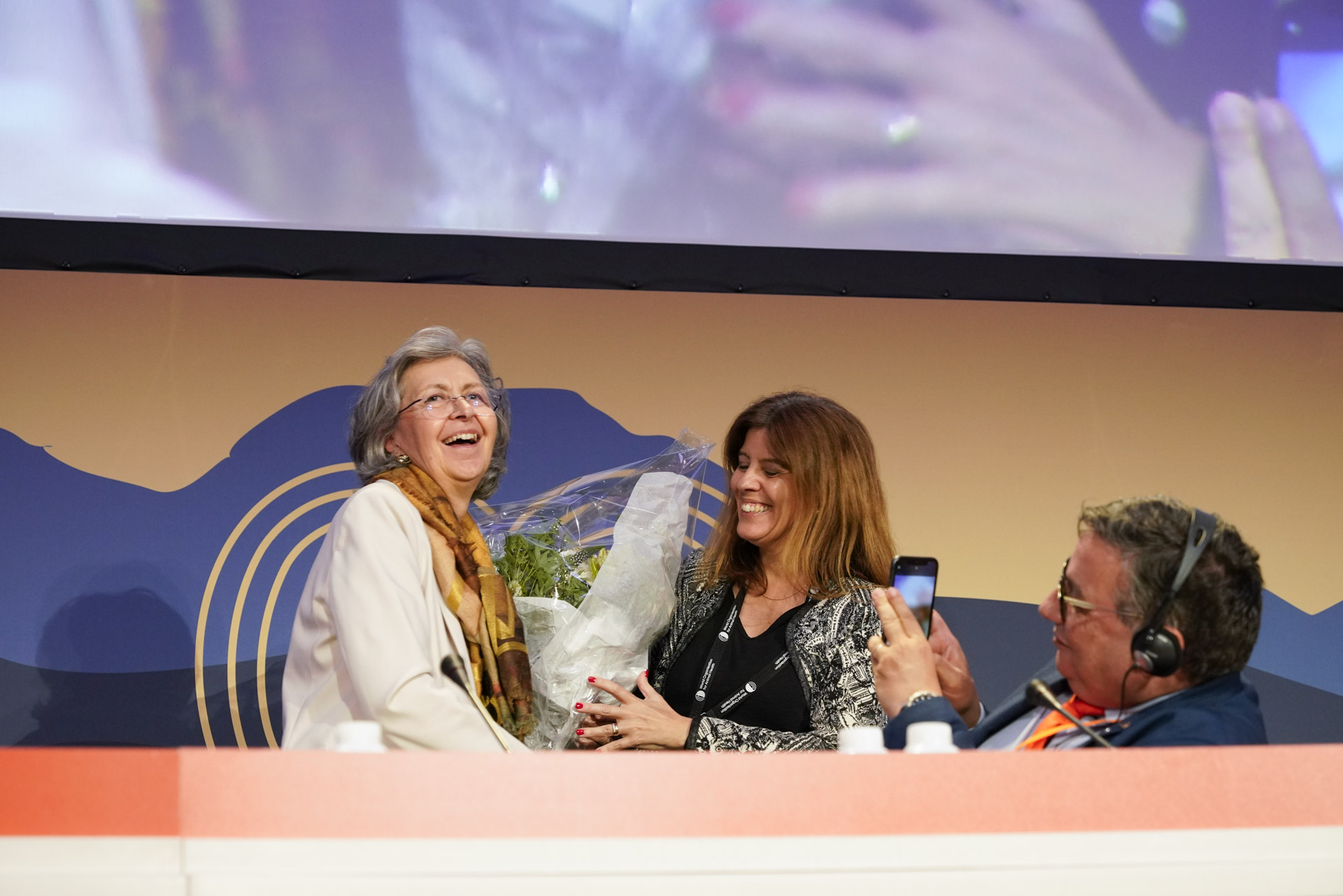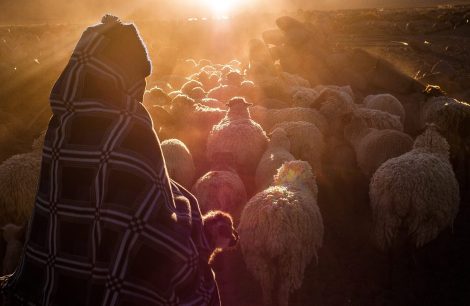
The World Organisation for Animal Health (WOAH) held its 91st General Session (GS91) of the World Assembly of Delegates starting on Sunday, 26 May 2024 to Thursday, 30 May 2024 at the Maison de la Chimie in Paris, France.
This year’s Session held a special significance as WOAH marks its 100th anniversary. During the five-day event, the global network came together to celebrate WOAH’s rich history and dynamic present, exploring ways we can collaboratively shape a sustainable future for global animal health and welfare.
The General Session event attracted over 1, 100 participants from 166 countries and territories – including representatives of Members as well as scientists and observers from partner organisations, international organisations that have signed an official agreement with WOAH, other international and regional organisations, observer countries and territories, WOAH key stakeholders, staff and special guests.
As part of the 91st General Session, WOAH hosted an Animal Health Forum focused on whether WOAH is ready for the next 100 years ?
African representatives standing up during the ice-breaker of the opening ceremony, facilitated by Dr Gillian Mylrea of the Standards Department. Picture (c) M. Tric (woah) 2024.
The General Session was attended by the following 37 African Members (countries and territories, either represented by the Delegate or the designated substitute) :
Dr Malek Zrelli, former Delegate and Regional Commission Vice-President, representing Tunisia (right) receiving the meritorious award from the President of the WOAH World Assembly, Dr. Hugo Federico Idoyaga Benítez. Picture (c) M. Tric (woah) 2024.
WOAH celebrated the winners of the animal health achievement awards.
Dr. Hugo Federico Idoyaga Benítez, President of the Organisation, and Dr. Monique Eloit, Director General, attended WOAH’s World Assembly of Delegates to recognise the award recipients’ contributions to animal and public health. Their efforts have helped create a healthier, safer, and more sustainable world.
Among the winners, was Tunisia’s Dr. Malek Zrelli, Senior Counsellor to Tunisia’s Minister of Agriculture, Water Resources and Fisheries and former Delegate and Vice-President of the Regional Commission for Africa. He received a meritorious honorary award for his outstanding service and contribution to WOAH in Africa. His work played a key role in the configuration of veterinary policies as well as involvement in the work of WOAH notably through Veterinary Services provision, this allowed the development of major guidelines and directives in the field of Veterinary Sciences.
Dr. Malek Zrelli, Senior Counseller to the Minister of Agriculture, Water Resources and Fisheries, WOAH Honoree Award 2024 winner, former Delegate of Tunisia and former Vice-President of Regional Commission for Africa
Meeting of the Regional Commission for Africa at the Maison de la Chimie. Picture (c) M. Sirdar (woah) 2024.
For the first time, the meeting of the Regional Commission for Africa took place in two distinct sessions, a first online session of around three hours took place on Tuesday afternoon, 21 May, whilst a second session took place, as a face-to-face meeting, on Monday morning of 27 May, for around two hours.
The Regional Commission for Africa met by videoconference on 21 May 2024. The meeting was attended by 84 participants, including Delegates from 29 Members of the Commission, 5 observers, and representatives from 16 International and Regional Organisations.
The attending Members of the Commission were: Algeria, Benin, Botswana, Burkina Faso, Burundi, Congo (Rep.), Congo (Dem. Rep.), Cote d’Ivoire, Egypt, Eritrea, Ethiopia, Eswatini, Gabon, Ghana, Guinea Bissau, Libya, Madagascar, Mali, Malawi, Morocco, Mozambique, Namibia, Nigeria, Rwanda, Senegal, Seychelles, South Africa, Togo and Tunisia.
Observers (organisations without a formal agreement with WOAH) were : the Coalition of African Animal Welfare Organisations (CAAWO), the Permanent Interstate Committee for Drought Control in the Sahel (CILSS), and ReAct Africa.
The international/regional organisations (organisations with a formal agreement with WOAH) in attendance were : the African Union Interafrican Bureau for Animal Resources (AU-IBAR), the African Union Panafrican Veterinary Vaccines Centre (AU-PANVAC), the Global Alliance for Livestock Veterinary Medicines (GALVmed), the Economic Commission for Livestock, Meat and Fisheries Resources(CEBEVIRHA), the European Commission (EC), the Secretariat of the Common Market for Eastern and South Africa (COMESA), the Global Alliance for Rabies Control (GARC), the Food and Agriculture Organisation of the United Nations (FAO), the International Centre for Insect Physiology and Ecology (ICIPE), the International Livestock Research Institute (ILRI), the West African Economic and Monetary Union (WAEMU), the World Bank (WB) and the World Health Organization (WHO).
The Meeting was chaired by Dr Honoré Robert N’lemba Mabela, President of the Regional Commission for Africa and Delegate of the Democratic Republic of the Congo, accompanied by Dr Karim Tounkara, Regional Representative for Africa.
The full and officially endorsed report of the meeting is available here : https://rr-africa.woah.org/app/uploads/2024/06/91gs-2024-wd-adm-03-regional-commissions-en-Africa.pdf
The Regional Commission for Africa met face to face on 27 May 2024, in the morning, at the Maison de la Chimie in Paris. The meeting was attended by 32 Members of the Commission: Algeria, Angola, Benin, Botswana, Central African Rep., Congo (Rep.), Congo (Dem. Rep.), Côte d’Ivoire, Djibouti, Eritrea, Ethiopia, Gabon, Guinea, Kenya, Liberia, Madagascar, Mali, Mauritania, Morocco, Mozambique, Namibia, Nigeria, Senegal, Seychelles, Somalia, South Africa, South Sudan (Rep.), Eswatini, Tanzania, Togo, Tunisia, Uganda and Zimbabwe.
The Meeting was chaired by Dr Honoré Robert N’lemba Mabela, President of the Regional Commission for Africa and Delegate of the Democratic Republic of the Congo, accompanied by Dr Karim Tounkara, Regional Representative for Africa.
The President of the Regional Commission summarised the main points discussed during the virtual meeting held on 21 May 2024, allowing the Regional Commission to confirm the main points agreed, namely the technical item proposed for the forthcoming Regional Conference, the strategic topics proposed to be addressed by WOAH through various means, the candidates proposed by the region to be presented to the World Assembly for the election of the Bureau of the Regional Commission, the Council and the Specialist Commissions :
.
Of importance as well was the submission by Professor Malek Zrelli, Senior Councillor of the Minister of Agriculture, Water Resources and Fisheries, on behalf of the Alternate Delegate of Tunisia, of a request to consider Tunisia’s National Animal Health Surveillance Centre (Centre National de Veille Zoo-Sanitaire or CNVZ) as a WOAH Collaborating Centre for Field Epidemiology.
The full and officially endorsed report of the meeting is available here : https://rr-africa.woah.org/app/uploads/2024/06/91gs-2024-wd-adm-03-regional-commissions-en-Africa.pdf
Newly elected WOAH Director General, Dr Emmanuelle Soubeyran.
Regional Commission meeting at the Maison de la Chimie on 27 May 2024. Picture courtesy of B. Gebrekidan (Ethiopia Country Manager at Africa One Health University Network) 2024.
After a total of nine years in office as Director General and eighteen years at higher management of WOAH, Dr Monique Eloit will pass the baton to Dr Emmanuelle Soubeyran, the candidate of France for the election and current WOAH Delegate of France.
Dra Susana Pombo, President of WOAH (2024 - 2027)
Ms. Soubeyran won the vote with 56% of the votes. This General Session also elected or re-elected the members of the WOAH Council, the Regional Commissions and the four Specialist Commissions. Dr Susana Pombo (Portugal) was elected as President the World Assembly of Delegates for a period of three years. Dr Roland Dlamini (Eswatini) was also re-elected, whereas Dr Mbargou Lô was elected to the Council for a first term (previously Vice-President of the Regional Commission). The following Delegates were (re)elected to the Bureau of the Regional Commission for Africa:
The Africa region therefore bids goodbye to Drs Batawui (Togo) and Shilongo (Namibia).
In terms of Specialist Commissions, all African experts, currently serving on these Commissions were re-elected :
Scientific Commission for Animal Diseases (SCAD)
Terrestrial Animal Health Standards Commission (TAHSC)
Biological Standards Commission (BSC)
Aquatic Animals Health Standards Commission (AAHSC)
The President of the WOAH Terrestrial Code Commission remains Dr Etienne Bonbon (France) and the newly elected President of the Aquatic Commission is Dr. Alicia Gallardo (Chile). The Biological Standards Commission remains under the leadership of Dr Emmanuel Couacy – Hymann (Cote d’Ivoire) and Dr. Christobal Zepeda from the United States was re-elected as President of the Scientific Commission for Animal Diseases (SCAD).
Drs Francesco Valentini (WOAH Tunis) and Mohamed Sirdar (WOAH Gaborone) manning the Africa Regional Kiosk on Monday 27 May. Picture (c) Melis Nurkan (woah) 2024.
The 14th GF-TADs Global Steering Committee was held as a hybrid meeting on 27 May 2024, at 12:30 p.m. CEST at the Maison de la Chimie in Paris. The meeting was co-chaired by Dr Neo Mapitse (WOAH) and Dr Madhur Dhingra (FAO) and attended by the Co-chairs of the Global GF-TADs Management Committee (MC) Dr Jean-Philippe Dop (WOAH Deputy Director General for Institutional Affairs and Regional Activities) and Dr Thanawat Tiensin (FAO Director of Animal Production and Health, Chief Veterinary Officer).
The GF-TADs Secretariat represented by Dr Alexandre Fediaevsky (WOAH) and Drs Bouda Ahmadi/ Karima Oulali (FAO) explained that this is the 3rd Session (3), where in the previous two sessions the Global strategy, the Partnership and Finance Panel, reports of the diseases working groups and reports of the regional steering committees were discussed. This session was dedicated to the launch of the Global Strategy and Control of Highly Pathogenic (or High Pathogenicity) Avian Influenza (2024-2033).
Dr Gounalan Pavade (WOAH) and Dr Ismaila Seck (FAO) presented the Global Strategy on the Prevention and Control of HPAI (2024-2033). In their presentation they highlighted the methodology used to develop the Strategy incorporating the One Health approach and including all relevant stakeholders in the process. This approach included a regional survey, considerations of the recommendations of WOAH’s Animal Health Forum on avian influenza during the 90th General Session, FAO Global consultation on HPAI, in addition to internal and external consultations.
The Strategy with the objectives to prevent, protect and transform was designed as a high-level strategy document to serve as a guideline for regional and national action plans. The presentation further highlighted the global, regional and national actions that need to be undertaken covering governance, partnerships, communication, One Health, sustainable livestock initiatives, national action plans implementation, information sharing, laboratory networks, advocacy and after-action review. The next steps following this launch with the goal to achieve effective HPAI prevention and control to support the protection of humans, animals and their environment will include:
Several members of the audiences provided comments on the Strategy and questions were taken from the floor. These points focused on advocacy for vaccination, surveillance, the role of the private sector, transformation of the value chain, standards, operationalisation of the One Health approach, sustainability and mechanism for technical cooperation. All points were noted, and some will be included in the recommendation for this meeting.
The Global Secretariat presented the 11crecommendations from Sessions 1 &2 for adoption. Members will be given 3 weeks for review and adoption.
Fltr : Karima Ouali (FAO), Alexandre Fediaevsky (WOAH), Bouda Ahmadi (FAO), Jean-Philippe Dop (WOAH) Thanawat Tiensin (FAO). Picture © M. Sirdar (woah) 2024.
Fltr : Drs José Urdaz (FAO), Roland Dlamini (RSC Africa), Bernard van Goethem (RSC Europe), Baoxu Huang (RSC Asia/Pacific), Gregorio Torres (WOAH) and Andriy Rozstalnyy (FAO). Picture © C. Chng (woah) 2024.
The meeting was opened by Dr Neo Mapitse, Head of the Regional Activities Department at WOAH and member of the GF-TADS Management Committee and Dr Baoxu Huang, President of the GF-TADs Regional Steering Committee for Asia and the Pacific. The latter was also appointed chair of the meeting. The side event was attended by 76 participants, of whom only three hailed from Africa, including Dr. Dlamini (see below). Dr. Gregorio Torres, Head of the Science Department at WOAH introduced the objectives of the meeting which were to :
The regional presentations were made by respective representatives of the regional steering committees (RSC), Dr. Ronald Dlamini (Eswatini) representing Africa. Whereas Europe and Americas shared their aspirations to work towards freedom of ASF, the majority of countries in Africa and Asia are currently living with the disease and this is also largely the aspiration for the next 3-5 years. The major common actions identified in Africa and Asia for VS were animal movement and border control, including strict biosecurity that should be implemented as the highest priority. There is a strong need for WOAH and FAO to strengthen Africa’s capacity building, specifically, surveillance and diagnostics (provision of reagents and tools), conduct simulation exercises, and increase the monitoring of wild pig populations.
Additionally, Dr Dlamini requested additional support for coordination, legislation, as well as advocacy, communication and awareness raising. Dr Huang on behalf of Asia and the Pacific requested that WOAH and FAO enhance collaboration, provide support in biosecurity, capacity building,as well as financial support, including for vaccination-related infrastructures and compensation mechanisms, and communication focusing on stakeholders, public awareness and education.
The meeting concluded that the potential priority areas for the GF-TADs Working Group for ASF could include:
Panel discussion on the future of WOAH. Left : Ms. Christiana Ololade Olajimbiti (Animal Welfare Chair of the IVSA). Right : Dr. Fajer Sabah Al Salloom (Delegate of Bahrein and Vice-President of the WOAH Council). Picture (c) M. Tric (woah) 2024
Organised in three consecutive sessions, on Tuesday 28 May, the Animal Health Forum intended to provide a platform to foster reflection on whether WOAH, in 2024, is ready for the future ?
Session 1 was intended to reflect on the present, with the help of panellists, amongst whom the WOAH Director General, Dr Monique Eloit and the WOAH Council Member, Dr Roland Dlamini, Delegate of Eswatini. In her introduction, Dr Monique Eloit mentioned how unforeseen events and lack of preparedness could be a handicap in crisis management, using the examples of the bovine spongiform encephalopathy (BSE) outbreaks of the 1980 – 1990s, as well as the recent COVID-19 pandemic.
The panellists noted the need to reduce disparity around the world, in access to resources and technology in the veterinary domain. Representatives of the international student body (International Veterinary Students’ Association, IVSA) noted the disparities in veterinary education around the world (practical training, curriculae, access to internships, etc.) and the need to adapt veterinary education to global needs and threats.
Session 2 was baptised “Journey to the future” and consisted of several break-out groups, tasked with discussing several future scenarios :
Using the Cvent events app and according to the scenario they were assigned, participants were asked to reflect (in groups or alone) and reply to the following questions:
Using foresight methods, Members were given the opportunity to brainstorm and discuss the future of animal health worldwide and gain a broader and longer-term perspective, thus enhancing their ability to adapt to rapid change and uncertainty.
The last session (Acting today to prepare for tomorrow) again brought together members of the WOAH Council and students from the IVSA. The session provided a summary from the breakout groups to share lessons learned from the future that inform decisions for the present. This included reporting back from the next generation, and presentation of the resolution to agree to review the Basic Texts.
Panel discussion on the future of WOAH. Fltr : Drs Gillian Mylrea (Head of Department, WOAH Standards Department), Marta Masserdotti (Chair of the Standing Committee on One Health of the IVSA) and Roland Xolani Dlamini (Delegate of Eswatini and WOAH Council Member). Picture (c) M. Tric (woah) 2024
Dr. Monique Eloit, Director General, used the 5 Strategic Objectives (SO) of the 7th Strategic Plan (SP7) as the basis of ther report to the World Aseembly.
Under Strategic Objective 1 (SO 1 : Scientific expertise) she highlighted two main activities. Firstly, she emphasised the significant progress in animal welfare, specifically in slaughter practices and transportation (both aquatic and terrestrial). This area, often neglected, has seen considerable advancements and is detailed in the annual report. Secondly, she discussed “BIO-PREVAIL,” a major initiative where WOAH is a key member and stakeholder. To support this, WOAH has issued a call for tender to develop an incidence management system (IMS).
Strategic Objective 2 (SO 2 : Data governance)
Dr. Eloit praised the WAHIS team’s remarkable efforts, organizing 46 training sessions for Delegates and Focal points, conducted both virtually and in person. She also announced the upcoming launch of the PVS Information System (PVSIS), which will be followed by a similar platform for the Official Status Management Platform.
Dr Monique Eloit on the podium. Picture (c) M. Tric (woah) 2024.
Strategic Objective 3 (SO 3 : Responding to Members’ needs)
The Director General reflected on the organisation’s resilience post-pandemic, organising 18 PVS missions that had previously been delayed. Additionally, she mentioned the finalisation of formalised guidelines for training veterinary assistants. Zoning was identified as a thematic topic, with 65% of members responding to a related questionnaire, though -admittedly- only 27% have incorporated zoning standards into their programmes.
Strategic Objective 4 (SO 4 : Collaboration with partners)
WOAH is actively collaborating with partners, exemplified by the GF-TADs in the global 2021-2025 Strategy and the One-Health Quadripartite with its Regional Secretariats. Efforts are also being made to strengthen relationships with financial partners. Dr. Eloit highlighted the increased visibility of WOAH, particularly through the Communications Department.
Strategic Objective 5 (SO 5 : Efficiency and agility)
A documented financial framework has been implemented, along with a new tool to provide precise follow-up on the organization’s expenses. An audit, notably on the WAHIS project, has been initiated for better resource utilisation understanding. Dr. Eloit expressed her gratitude to the Council for allowing the Organisation to revise the basic texts and remained confident in the continued progress.
Overall, SO 5 showed significant progress when viewed through the various performance scorecards. Dr. Eloit proposed extending the Strategic Plan’s implementation to 2026, urging Delegates and staff to support the new Director General as she develops the 8th Strategic Plan.
Achievements to Date
Dr. Eloit concluded the formal part of her report by underscoring the importance of the future Pandemic Treaty, positioning WOAH as a major stakeholder.
This being the Director General’s last report to the World Assembly, Dr Eloit took advantage of this opportunity to personally thank many of her closest collaborators and those inside and outside the Organisation who had supported her throughout her mandates as Deputy and then Director General. At times emotional, she made a special mention of WOAH’s long-serving Executive Assistant to the Director General, Ms. Isabelle Cusin.
She urged the Members, Delegates and staff to maintain the Organisation’s high standards of integrity and left with the conviction that she leaves the Organisation in a better state than she found it in.
Fltr : Drs Neo Mapitse, Jean-Philippe Dop (WOAH), James Wabacha, Huyam Salih (AU-IBAR), Monique Eloit, Karim Tounkara and Rachid Bouguedour (WOAH). Picture © S. Kihu (woah) 2024.
First signed between the OIE and the then Organisation of African Unity (OAU) in 2001, the Agreement was renewed in 2015, between OIE and the Interafrican Bureau for Animal Resources (AU-IBAR), on behalf of the African Union Commission. The current renewal marks a new departure for the relation between the (now) World Organisation for Animal Health (WOAH) and the African Union Interafrican Bureau for Animal Resources (AU-IBAR).
A Memorandum of Understanding with the Secretariat of the Southern Africa Development Community (SADC) was also renewed.
Left : Ms. Providence Mavubi, Director of Industry and Agriculture at the Common Market for Eastern and Southern Africa (COMESA). Right : Dr Monique Eloit, Director General, WOAH. Picture © M. Sirdar (woah) 2024.
First signed between the OIE and the COMESA Secretariat in 2018, the Memorandum of Understanding is being renewed, amongst others, with the implementation of the new EU-funded project on “Support from the World Organisation for Animal Health (WOAH) to the implementation of SPS Annex 7 of the African Continental Free-Trade Agreement (AfCFTA) Protocol on Trade in Goods“, of which the COMESA Membership, one of the largest in Africa, is a major beneficiary.
Dr Jenny Hutchison, Head of the World Animal Health Information and Analysis Department, and Dr Laure Weber-Vintzel, Head of the Data Integration Department, jointly gave a presentation on the “Animal Health Situation Worldwide”.
Dr Jenny Hutchison highlighted the key achievements made in regard to WAHIS with a final countdown towards a new WAHIS launch by early June 2024 which will include optimized six-monthly report module and annual report module; and optimisation and improvement of WAHIS dashboard performance. She also spoke about the improvement in reporting by Members via the Early Warning module, particularly immediate notifications and follow up reports.
Dr Laure Weber-Vintzel presented on animal health situations for 2023-2024, focusing on highly pathogenic avian influenza (HPAI), African swine fever (ASF), foot and mouth disease (FMD) and vector borne disease. There has been an unprecedented outbreak and spread of HPAI both in domestic poultry and wild birds in the world, with vast majority of the outbreaks caused by clade 2.3.4.4b. It has also caused infection in dairy cattle in US. The outbreak of HPAI has caused severe economic impact globally through death and culling of poultry birds and also caused infection in 15 humans in eight countries.
On ASF, she spoke on the importance of conducting surveillance, focusing on molecular surveillance to understand the ASF transmission dynamics. The role of wildlife in the epidemiology of ASF is clearly demonstrated in Africa and Europe but is not well understood in other continents, thus require continuous surveillance. There are reports of ASF outbreaks in wild pigs in some countries which pose a risk for transmission and spread to domestic pigs. There is no vaccine for ASF and use of sub-standards vaccine against ASF pose a high risk.
On FMD, serotype C was not reported in animals since 2004 and Members are urged to continue conducting serotyping of the FMD virus to confirm this apparent eradication.
Vector borne diseases are spreading with a report of 2 501 outbreaks during 2023-2024, possibly due to changes in weather pattern and climate change.
In order to understand the disease pattern and make an evidence-based policy decision, data quality, timely and regular reporting and data integration is important.
This year’s report focuses primarily on informing Members on selected important events and trends relating to animal health situation worldwide in 2023 and early 2024, relevant for risk management, and the report is available here : https://www.woah.org/en/document/91gs-tech-01-animal-health-situation-worldwide/
Dr. William Karesh, Chairman of the Wildlife Working Group (WWG), presented an overview of the Working Group’s activities since the previous General Session and the results of its meetings held from June 20 to 23, 2023 and from November 28 to December 1, 2023.
The WWG discussed the results of WOAH’s collaboration with international partners and identified priorities for further engagement. Key partners include the International Union for Conservation of Nature (IUCN) and the Convention on International Trade in Endangered Species of Wild Fauna and Flora (CITES). Collaboration may be strengthened in the future with the Wildlife Disease Association (WDA) and the United Nations Environment Programme (UNEP) as part of the N4H project. The Task Force continued its collaboration with the Code Commission, with whom the Task Force identified specific chapters of the Terrestrial Animal Health Code that required updating and input from wildlife experts, either because the epidemiology of a disease concerned wildlife, or because the chapter presented opportunities to integrate aspects relating to improving wildlife health.
He mentioned that the WWG was impressed by the extent of the scoping work that had been carried out to ensure that the next generation wildlife disease reporting system (which will replace WAHIS-Wild) was useful. It stressed that an enabling environment was essential to facilitate the collection and dissemination of wildlife disease data (including emerging diseases) useful for animal health, public health and biodiversity.
The WWG welcomed the recent creation of a formalised network of collaborative centers working on wildlife health, as well as the development of its own terms of reference and work plan. It emerged that members of the WWG had been involved in the production of a number of “reels” which were disseminated through WOAH’s social media networks to promote the contribution of wildlife health to animal and human health.
In conclusion, Dr. Karesh pointed out that wildlife health was one of the most popular topics on WOAH’s communication platforms, offering an opportunity for WOAH to raise its profile.
The report of the AMR Working Group was delivered on 28 May 2024 by the Chairperson of the Working Group (WG) Dr Tomoko Ishibashi. In her reported, she provided a background covering the rationale of the creation of the WG in 2019 in response to Resolution 14 and the recommendations of the 2018 2nd AMR Conference that was held in Marrakech, Morocco. The background section also highlighted the functions of the WG and composition of its members.
The Chairperson informed attendees that following an open recruitment selection process during the summer of 2023, three new AMRWG members appointed by the Director General including a member of Africa.
The main activities in 2023/2024 of the Group included:
The Chairperson also highlighted the outcomes of the 8th report of “Antimicrobial agents intended for use in animals” that was recently published and noted the slight increase (2%) in the overall use of antimicrobial. However, it was noted that although Africa only consume less than 10% of the global production of antimicrobials, there was a dramatic increase of antimicrobial use in the recent report (179%). This could be attributed to enhancement in reporting. Additional important outcome of the report is that there are still 36 Members using antibiotics as growth promotors.
The Working Group recommended that members enrol in the open call for VSAFE project, continue with further development of ANIMSE and encouraged members to submit their AMU data to ANIMUSE.
In conclusion, the chairperson referred to the upcoming high-lever AMR meeting that will be held in September 2024 at the sidelines of the United Nation General Asemebly. WOAH’s position was presented focusing on four priority areas including
Delegates were encouraged to liaise with their counterparts attending the meeting and advocate for WOAH’s position for improved animal health.
The President of the Terrestrial Code Commission, Dr Etienne Bonbon (France) introduced the activities of the Commission over the past year and then went on to present a total of 16 draft standards (either new or revised) for adoption, some disease related, others related to products, animal welfare or antimicrobial resistance :
Minor deletions and amendments, in terms of terminology (semen collection centres, instead of artificial insemination centres) were adopted for Chapters 4.6. and 4.7. (General hygiene in semen collection and processing centres, and Collection and processing of bovine, small ruminant and porcine semen).
Chapter 6.10. on Responsible and prudent use of antimicrobial agents in veterinary medicine, underwent a comprehensive review, ten years after its initial adoption in 2014. Changes have been made on the definitions and it the chapter now covers non-food producing animals due to risk of transmission of the AMR in the environment due to the use of antimicrobials in animals. Elaboration on National action planes on AMR and responsibilities of stakeholders involved in animal production to use of antimicrobials in animals have been included. Despite the many comments during the session, the chapter was adopted with minimal considerations received.
Another major overhaul concerns the animal welfare Chapter 7.5. on Slaughter (for human consumption). Despite numerous comments and questions, mostly in respect of issues surrounding stunning, the Chapter was unanimously adopted.
Two revised chapters on Foot-and-mouth disease (FMD) were presented for adoption : Chapter 8.8. on Infection with foot and mouth disease virus and Chapter 1.11. on Application for official recognition by WOAH of free status for foot and mouth disease. Despite some comments raised about the role of the African buffalo and the designation of protein meal as a safe commodity, both chapters were adopted, with the support of the AU Members, as voiced by Morocco. The draft revision of the Chapter 8.8. had been circulated no less than 8 times, since 2015.
Minor changes to the chapters on Rift valley fever and Trichinella spp. were easily adopted, as they were mainly intended to align the recommendations of the Biological Standard Commission and the Manual with those of the Code in terms of importation of semen and embryos, and deletions of references to the genotypes of Trichinella respectively.
Long listed, but without a dedicated chapter in the Code, Coxiella burnettii or Q-fever now has a chapter (8.X) defining the rules for trade in susceptible species and products. Another new chapter (8.Z.) concerns Trypanomosa evansi or Surra, a non-tsetse transmitted trypanosomiasis. Despite objections from Australia regarding the risk of transmission of T. evansi through semen, considered too trade restrictive, the new chapter was unanimously adopted.
Likewise, under the new Section 16 on camel diseases (Camelidae), a new chapter was added on Camel pox (16.Z.), aligned with the existing Chapter 3.5.1. in the Manual, adopted in 2021. Camel pox has been a listed disease for several years, but without a Code chapter.
Rabbit haemorrhagic disease (RHD) in Chapter 13.2., is henceforth being defined as an infection of leporids (i.e. rabbits) with Rabbit haemorrhagic disease virus type 1 (RHDV) or Rabbit haemorrhagic disease virus type 2 (RHDV2) (hereafter referred to as ‘pathogenic rabbit lagoviruses’).
In Chapter 15.1. three commodities were added to the safe commodities for African swine fever (ASF) : heat-treated meat products in a hermetically sealed container with a F0 value of 3 or above; extruded dry pet food and protein meal.
In conclusion, the World Assembly adopted changes in terms of the Glossary definitions and horizontal changes across numerous chapters :
…as well as Chapter 1.3. of the listed diseases, amended as a result of the above-mentioned amendments (name changes, new chapters, etc).
Dr Cristóbal Zepeda, President of the Scientific Commission for Animal Diseases (SCAD) presented the report of the activities of SCAD for the year 2023-2024. The report included recognition of disease-free status for specific countries, namely: AHS free status for Egypt, PPR free status for Azerbaijan, FMD free where vaccination is not practised for Liechtenstein and CBPP-free status for Czech Republic and Norway.
SCAD provides input on Global Strategies and Initiatives for various diseases, including Peste des petits ruminants (PPR), Rabies, Zoonotic tuberculosis (M. bovis), Foot and mouth disease (FMD), amongst others.
The Pan-African PPR eradication programme and its submission for funding to EU DG-INTPA, was highlighted as a key achievement towards global control and eradication. Funding for this proposal is expected later in the year 2024 and will be a major boost for the on-going PPR eradication efforts in Africa.
On Zoonotic tuberculosis, caused by Mycobacterium bovis, it was announced that new guidelines, to be published in mid-2024, will be particularly useful in the (alternatives to the) control of zoonotic TB in developing countries, where the “test and slaughter” strategy is no longer deemed applicable. On-going work on standards for bovine and avian tuberculin is critical in this respect.
On Rabies, it was reported that the United Against Rabies (UAR) network had grown to over 80 organisations in 2023-2024 period, and a map of the UAR partners had been developed with an aim to coordinate these partnerships. The effort of GAVI to support to countries increase access to human post-exposure prophylaxis, was also highlighted as a major development in the advancement towards the “Zero by 30” global aim of rabies elimination. The development of guidelines for oral rabies vaccination of dogs, as well as guidelines on use of rapid immunochromatographic tests (rapid kits) for surveillance of rabies, were also highlighted.
Regarding African swine fever (ASF), Dr Zepeda noted that the Global Coordination Committee (GCC) for ASF, which was launched in 2023, and had met for the second time earlier this week, had identified three priorities which are:
Standards for ASF vaccines have been developed and reviewed by the Biological Standards Commission, and various activities aligned to the three priorities were on-going.
In his report on Avian Influenza, Dr Zepeda highlighted the revision of the Global Strategy for prevention and control of High Pathogenic Avian Influenza (HPAI). The revision of the Global Strategy was initiated by the WOAH-FAO OFFLU network, whereby the previous version of the 2007 Global Strategy was reviewed and updated to incorporate learnings and recommendations from the recent HPAI pandemic. The OFFLU network continues to support genomic surveillance of HPAI across all continents. Guidelines for emergency HPAI vaccination of wild birds under specific situations were also produced.
Dr Zepeda further reminded Delegates of countries with an official disease free status, of the importance of compliance with the provisions of the Terrestrial Code on the requirements for importation from countries or zones with no official animal health status, awarded by WOAH. In response to an intervention from South Africa, it was clarified that if a country with a disease-free status, recognised by WOAH, is importing from a country with no official declaration of disease status, the provisions of chapter 5.3. of the Terrestrial Code should be complied with. These provisions are based on the principle of “equivalence”, as defined in the SPS Agreement and provide an alternative to commercial exchanges between officially disease free countries only.
It was reported that SCAD, had reviewed and endorsed new case definitions for five diseases, including Crimean Congo haemorrhagic fever (CCHF) and Tularaemia. It was further recommended that Nairobi Sheep Disease be subjected for listing assessment to determine if it should be retained as a WOAH-listed disease, noting that no reports on the same had been submitted for decades. Considering the importance of animals in the epidemiology of SARS-CoV-2, SCAD recommended – short of listing the diseases – to retain the disease as an emerging disease.
The President of the Commission, Dr Ingo Ernst (Australia) presented the work of the Commission during the just concluded term (since 2021), followed by the presentation of draft standards for both the Aquatic Code and Manual.
Many of the proposed revisions of the Code are related to alignment between the Terrestrial and the Aquatic Codes in terms of terminologies in the Glossary : veterinary authority, competent authority, aquatic animal health services, as well as aquatic animal products (rather than “products of aquatic animal origin”). Other alignments concerned the review of most articles 3 in chapters 8 (amphibians), 9 (crustaceans) and 10 (fish) on safe commodities, as well as to align the structure of the chapters on amphibians and molluscs with those on crustaceans and fish. Traditionally, much attention is required to list the susceptible species for certain disease, especially the recently listed diseases, such as Decapod iridescent virus 1 (DIV1) or Tilapia lake virus (TiLV), as well as Perkinsus marinus, whereby some of the species listed as “under study” were either confirmed as susceptible, or removed.
A complex issue was tackled last, the matter of adopting a new disease complex, named Megalocytisvirus pagrus 1, which includes 3 geno-groups, one of which is already listed (RSIV or Red sea bream iridovirus) and one was proposed for adoption (ISKNV or Infectious spleen and kidney necrosis virus). Following taxonomic reviews, the proposal to merge the three diseases under one name, including Red sea bream iridovirus, Infectious spleen and kidney necrosis virus, and Turbot reddish body iridovirus (TRBIV), was faced with opposition by many Members, many of which argued it did not meet all the requirements of the algorithm for listing. The EU bloc, Australia, China (PRC), India and South Africa, on behalf of the AU Members, came out in support of adoption, highlighting the possibility of notification (through WAHIS) of the distinct geno-groups, as is the case for e.g. serotypes, and underlining the threat to both biodiversity and commercial aquatic production species such as Tilapia spp. The chapter was eventually adopted majority against minority (4 Members voting against, with 21 Members abstaining).
Twenty chapters of the Aquatic Manual were reviewed of the 2021 – 2024 term, nine of which were submitted for adoption to the World Assembly in this session. These pertained to the comprehensive revision of the articles on “General Information” on diseases of crustaceans (2.2.0.) and molluscs (2.4.0), as well as comprehensive reviews of chapters on Crayfish plague (Aphanomyces astaci), White tail disease, Yellow head virus 1 and Decapod iridescent virus 1 (crustaceans), Abalone herpes virus, Martella refringens and Perkinsus marinus (molluscs), the latter to align the list of susceptible species with those (just approved) of the Aquatic Code.
Dr Emmanuel Couacy-Hymann (Côte d’Ivoire), President of the Biological Standards Commission (BSC), presented the annual activity report (two statutory meetings held in September 2023 and February 2024). He then provided a summary of the achievements of the commission in its 3-year term (September 2021 – February 2024) including 34 adopted chapters, 7 new collaborating centres, and 25 new reference laboratories.
Afterwards, he provided an overview of the Manual of Diagnostic Tests and Vaccines for Terrestrial Animals texts proposed for adoption, 12 chapters, all of which were adopted without objection or abstention.
Introductory chapters
The Delegate of Senegal expressed concerns on the difficulty of acquisition of diagnostic kits and asked WOAH to broaden scope of diagnostic kits.
Disease chapters
The Delegate of Australia noted two errors; anaplasma belongs to family Elucioceae instead of family Anaplasmataceae. Change of taxonomy was made in the taxonomic database LPSN; appendix 6 that contains diagnostic testing options for determining the immune status of individual animals also contains several misplaced points about bovine diarrhoea virus instead of bovine anaplasmosis. The Commission noted the comments.
Ireland speaking on behalf of the EU countries supported the adoption of the proposed chapters and welcomed the decision to postpone the revision of the ASF chapter.
Dr Couacy-Hymann then presented the BSC’s work on Chapter 3.9.1. African swine fever (vaccine section only) including minimum requirements for live vaccines. He highlighted points requiring further consultation including safety in non-vaccinated and non-target age groups of pigs including pregnant sows and boars. The proposed revision is expected to be presented for adoption in May 2025.
He further shared the criteria for keeping chapters on non-listed diseases in the Terrestrial Manual including having an important differential diagnosis for a listed disease, existence of a reference laboratory for the disease, and existence of a corresponding Terrestrial Code chapter. Based on the criteria, the following chapters were removed from the manual and will still be available from the BSC secretariat upon request.
Dr Couacy-Hymann further shared about a change of the reporting format with the aim of increasing the transparency of the WOAH process for the elaboration of Standards.
The distribution and activities of the reference laboratories and collaborating centres were then presented, highlighting the importance of WOAH twinning projects to improve laboratory capacity worldwide. He expressed a need for reference laboratories for some important diseases notably PPR in Africa.
Seven new laboratory twinning projects were approved including (for Africa)
An update on rinderpest holding facilities was provided with the number reducing from 44 labs in 2012 to 5 labs in 2024. In terms of emergency preparedness, there are 2 vaccine reserves (including AU-PANVAC) one vaccine seedbank and 4 WOAH reference laboratories.
Dr Couacy-Hymann then presented the register of diagnostic kits. New terrestrial diagnostic kits certified by WOAH for a period of 5 years are:
Renewal for a period of 5 additional years:
Due to the small number of registered diagnostic kits in the last 20 years, it has been decided to completely freeze the register’s activities and all related procedures right after the 91st General Session for a period of 24 months until May 2026. During this period there will only be consideration of exceptional cases, linked to an animal health emergency upon Members’ requests.
Dr Couacy-Hymann then presented the work programme for the BSC including updating the Terrestrial Manual, enhancing the annual performance review of the expertise network and increasing its visibility and accessibility, implementing SOPs for case definitions and a virtual biobank.
He extended special thanks to Dr Steven Edwards who retired after more than 4 decades of distinguished service to the BSC in various capacities. He concluded by thanking the various individuals involved in the standard setting process.
Following a request for clarification from Botswana, the DG clarified why the register of kits has been frozen. She explained that the number of submissions is too low to justify the process thus the freeze is to allow analysis of the situation and determine how the process can be made more attractive for manufacturers.
Dr Emmanuel Couacy-Hymann (Côte d’Ivoire), President of the Biological Standards Commission (BSC), presenting the annual activity report. Picture (c) M. Tric (woah) 2024
The Scientific Commission for Animal Diseases presented a resolution for the recognition of several new Collaborating Centres, the following of which are situated in Africa :
The Biological Standards Commission presented a resolution for the recognition of several new Reference Laboratories, which was unanimously adopted. The following are from Africa :
The Scientific Commission for Animal Diseases presented a resolution for the recognition of several new official diseases statuses, one of which is the recognition of Egypt as country free of African horse sickness (AHS). Interestingly two European Members (the Czech Republic and Norway) gained recognition of freedom from a currently almost exclusively “African” disease, Contagious bovine pleuropneumonia (CBPP).
The outgoing Director General, Dr Monique Eloit (left) with the WOAH Regional Representative for Africa, Dr Karim Tounkara. Picture (c) M. Tric (woah) 2024
The second administrative session was dedicated to the activities of the Council and the presentation of the financial performance of the Organisation, in terms of financial reporting by the Director of Administration, Mr. Xavier Pairault, the internal auditing by the Council, presented by Dr. Wilmer José Juarez (Nicaragua) and the external auditing (Mr. Didier Selles), the latter of whom dedicated some of his report to the development challenges of the new WAHIS platform, which are now being overcome with the appointment of an external IT project manager, funded by the Gates Foundation.
The budget of the Organisation, in 2023, was primarily constituted of three components :
Expenditure in the Organisation has seen an increase of 61% compared to 2018 and 18% compared to 2022, due in large part to the broadening scope of activities of the Organisation.
The 2025 budget stands at EUR 43,113,950, requiring an 6.9% statutory contribution increase. This resolution was approved, with many Members nonetheless abstaining in the vote, not been mandated to accept an increase of their national contributions.
The resolution regarding the revision of the Basic Texts was approved by all Members present, without abstentions or opposition.
PDF - 605.85KB
Dr Monique Eloit receiving a bouquet of flowers from incoming President Dr Susana Pombo. Picture (c) M. Tric (woah) 2024
The General Session was declared closed by the outgoing President, Dr Hugo Federico Idoyaga Benítez, who thanked all Delegates for their support throughout the past three years, as well as the support of his own Government (of Paraguay) allowing him to conduct this assignment efficiently and diligently. He wished great success to his successor, Dr Susana Pombo (Portugal) and called both the outgoing and the incoming Director Generals onto the stage for a last heartfelt goodbye.
The next General Session will take place from Sunday 25 to Thursday 29 May 2025.
